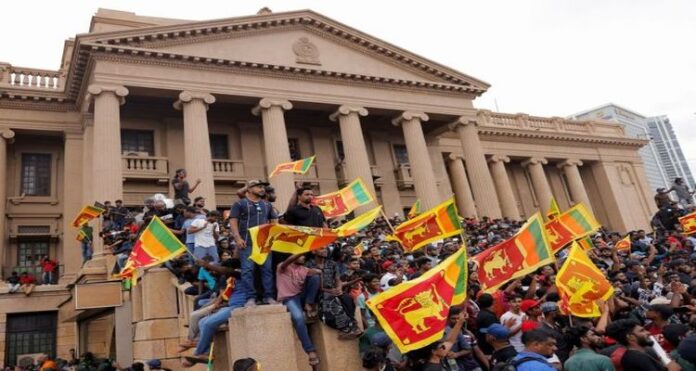| Translate This News In |
|---|
Anti-government protesters in Sri Lanka continued to occupy the homes of President Gotabaya Rajapaksa and Prime Minister Ranil Wickremesinghe on Sunday, a day after barging into the premises and torching one of the buildings in protest of the country’s severe economic crisis, even as the island nation remains in the dark about the embattled President’s whereabouts.
Since the protesters arrived in the city, Rajapaksa’s only communication has been with Parliament Speaker Mahinda Yapa Abeywardena, who declared late Saturday that the President would resign on Wednesday.
After Abeywardena wrote to him seeking his abdication following the all-party leaders’ meeting on Saturday evening, President Rajapaksa informed the Speaker of his decision to resign.
In the absence of both the President and the Prime Minister, the Speaker would take over as President. Later, a vote among MPs will be held to select a new President. Wickremesinghe, the Prime Minister, has also offered to resign.
Prime Minister Wickremesinghe, whose private residence was extensively arson-attacked last night, remains in office despite calls to resign.
Wickremesinghe, who has conveyed his willingness to resign, said in a statement Saturday night “This country is experiencing fuel and food shortages. The World Food Programme will make an important visit next week, while crucial talks with the IMF must continue. So, if the current government steps down, the next must take its place.”
Speaker Abeywardena had called On president Rajapaksa and Prime Minister Wickremesinghe to resign immediately in order to make way for an all-party government, following the country’s largest protest in decades amid an unprecedented economic crisis.
The IMF said on Sunday that it was actively watching the ongoing developments in Sri Lanka and wished that the political crisis would be resolved soon, allowing dialogue on an IMF-supported program in the cash-strapped country to resume.
General Shavendra Silva, the chief of defense staff, appealed for calm. He stated that a peaceful resolution to the current political crisis is now possible, and that the public must assist security forces in maintaining peace and stability.
Meanwhile, the national hospital in Colombo reported that 102 people had been publicly acknowledged with injuries. There are 11 media personnel among them.
The police’s special task force has been accused of savagely beating two television journalists during a protest at the prime minister’s private residence.
The attack sparked a backlash, resulting in the house being set on fire by protesters.
The main opposition SJB announced that their constituent parties will meet this morning to assess the political situation.
At least four Cabinet ministers have announced their resignations. Agriculture Minister Mahinda Amaraweera has said he will resign as soon as he ceremonially received the stock of fertiliser due from India on Sunday.


















